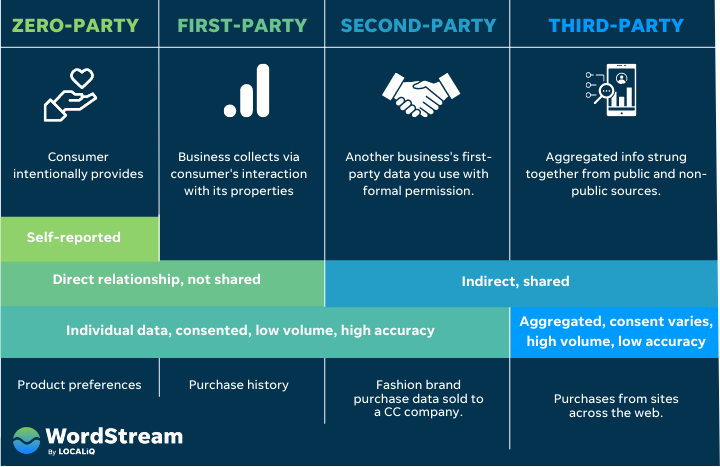Starting on January 4th, 2024 Chrome is set to initiate a phased approach towards disabling third-party cookies. Commencing with 1% of users for testing purposes, the plan is to incrementally escalate to 100% of users by Q3 2024. In the following article I’m going to try to explain how these changes will affect businesses directly and what you can do in order to preserve the functionality of your online campaigns.
Understanding the recent cookie changes
In an era dominated by digital advancements, Google’s recent updates regarding cookies have sent ripples through the online ecosystem, fundamentally altering the landscape for businesses of all sizes. Cookies, the tiny data snippets stored on users’ browsers, have been essential for monitoring online behaviors and enabling the delivery of personalized content. However, Google’s recent initiatives mark a decisive shift toward enhanced user privacy, aligning with evolving global standards.
Google’s substantial changes, particularly its plans to phase out third-party cookies from its Chrome browser, signify a paradigm shift in the digital advertising realm. Small enterprises, often reliant on targeted advertising to reach their niche audiences, now face a crossroad. The significance of these updates lies in Google’s commitment to fostering a more privacy-centric web experience. By limiting the use of third-party cookies, Google aims to increase user privacy, a move that resonates with the growing concerns about data security and online tracking.
 For small businesses, this shift poses both challenges and opportunities. While it may pose hurdles in terms of targeted advertising and data-driven marketing strategies, it also compels enterprises to explore innovative and privacy-conscious approaches. Understanding and adapting to these changes is paramount for businesses aiming to thrive in this dynamic digital environment.
For small businesses, this shift poses both challenges and opportunities. While it may pose hurdles in terms of targeted advertising and data-driven marketing strategies, it also compels enterprises to explore innovative and privacy-conscious approaches. Understanding and adapting to these changes is paramount for businesses aiming to thrive in this dynamic digital environment.
The evolution of cookies in online marketing
The evolution of cookies in online marketing mirrors the dynamic progression of the digital landscape. Initially conceived in the early days of the internet as simple files to enhance user experience, cookies have metamorphosed into integral tools for online marketing and data analytics. Traditionally, cookies served a benign purpose, storing user preferences or login information. However, with the rise of e-commerce and digital advertising, their role expanded to include tracking user behavior across websites, enabling targeted advertising and personalized content delivery.
Over time, concerns regarding user privacy and data security emerged, prompting regulatory bodies to scrutinize the unrestrained use of cookies. Against this backdrop, Google’s recent decision to phase out third-party cookies in its Chrome browser is a pivotal chapter in this evolution. The tech giant acknowledges the changing expectations of users and aims to address concerns related to intrusive tracking. By limiting the prevalence of third-party cookies, Google seeks to strike a balance between delivering personalized experiences and safeguarding user privacy.
Key features of Google’s updated cookie policies
- Phase-out of third-party cookies: Google’s updated cookie policies involve the gradual elimination of third-party cookies in its Chrome browser. This strategic move aims to reduce cross-site tracking, bolstering user privacy and addressing growing concerns about data surveillance.
- Introduction of FLoC (Federated Learning of Cohorts): Google proposes the use of FLoC, a privacy-focused alternative to traditional third-party cookies. FLoC groups users with similar browsing habits into cohorts, enabling advertisers to target broader audience segments without individually identifying users. This innovation seeks to balance personalized advertising with heightened privacy measures.
- Enhanced Privacy Sandbox: Google emphasizes its commitment to fostering a privacy-centric web environment through the Privacy Sandbox initiative. This framework introduces privacy-preserving APIs, such as Trust Token API and First Party Sets, allowing businesses to provide personalized experiences without compromising individual user data.
- User-focused ad transparency: The updated policies aim to provide users with increased transparency and control over their data. Google intends to empower users with tools to manage and understand how their information is utilized for advertising purposes, enhancing overall trust in the digital ecosystem.
- Impact on small businesses: For small business owners, this shift entails adapting marketing strategies. While the reduced reliance on third-party cookies may pose initial challenges in targeted advertising, it encourages businesses to explore more creative and direct engagement strategies. Emphasizing the importance of first-party data and customer relationships becomes crucial for sustained success in this evolving landscape.
In summary, Google’s updated cookie policies mark a significant shift toward user privacy and transparency. The introduction of alternatives like FLoC and the emphasis on Privacy Sandbox showcases the tech giant’s commitment to navigating a digital future that respects user autonomy and data security. Small business owners and entrepreneurs can leverage these changes by aligning their marketing approaches with the evolving privacy-conscious landscape.
Impact on marketing strategies for small businesses
- Challenges in targeted advertising: The phasing out of third-party cookies challenges the traditional model of targeted advertising, which relies heavily on user tracking. Small businesses accustomed to leveraging this strategy may face difficulties in reaching specific audiences with the same precision.
- Shift towards first-party data: With third-party cookies losing prominence, the focus shifts to first-party data. Small businesses need to prioritize building direct relationships with their customers, encouraging sign-ups, and obtaining consent for data usage. This not only ensures compliance with privacy regulations but also establishes a foundation for personalized marketing.
- Explore alternative targeting strategies: As traditional methods lose efficacy, businesses must explore alternative targeting strategies. Utilizing contextual targeting, where ads are based on the content of the web page rather than user behavior, can become a viable option. Understanding the context in which potential customers engage with content becomes crucial for effective outreach.
- Embrace privacy-focused technologies: Small businesses should embrace privacy-focused technologies, such as Google’s proposed FLoC, which groups users based on similar interests without exposing individual identities. Adapting to these technologies allows businesses to continue delivering personalized experiences while respecting user privacy.
- Enhance transparency and user trust: Google’s emphasis on user transparency aligns with a broader trend in digital marketing. Small businesses can stand out by prioritizing transparency in their data practices, explaining the value exchange to users, and ensuring that their marketing efforts are perceived as trustworthy and respectful of user privacy.
- Invest in diversified marketing channels: Diversification becomes a key strategy. Relying solely on digital advertising may prove challenging in a cookie-constrained environment. Small businesses should explore a mix of marketing channels, including social media, email marketing, and content marketing, to maintain a holistic approach and mitigate risks associated with overdependence on a single channel.
While challenges in targeted advertising may arise, embracing first-party data, exploring alternative targeting methods, and prioritizing transparency can position small enterprises to adapt and thrive in this evolving digital landscape. By investing in diversified marketing channels and staying abreast of privacy-focused technologies, businesses can navigate the changing environment while maintaining effective and ethical marketing practices.
Practical steps for small businesses to prepare
- Audit current data practices:
- Conduct a comprehensive review of current data collection and usage practices to ensure compliance with evolving privacy standards.
- Identify areas where reliance on third-party cookies is high and evaluate the potential impact of reduced cookie functionality.
- Embrace first-party data collection:
- Prioritize building direct relationships with customers through email subscriptions, loyalty programs, and personalized content offerings.
- Implement strategies to incentivize users to willingly share data, fostering trust and ensuring compliance with privacy regulations.
- Explore alternative targeting strategies:
- Investigate and implement contextual targeting, focusing on the content of the webpage rather than individual user behavior.
- Consider partnerships with platforms that leverage alternative identifiers or technologies, such as those based on artificial intelligence or machine learning.
- Invest in privacy focused technologies:
- Familiarize yourself with emerging privacy-focused technologies like Google’s Federated Learning of Cohorts (FLoC) and assess their compatibility with your business model.
- Experiment with and adopt privacy-preserving APIs from Google’s Privacy Sandbox to enhance user experiences without compromising privacy.
- Diversify marketing channels:
- Reduce dependency on a single channel by diversifying marketing efforts across platforms such as social media, email marketing, content marketing, and search engine optimization (SEO).
- Explore offline marketing channels and partnerships to reach audiences in different contexts and environments.
- Enhance transparency and communication:
- Clearly communicate data usage policies to customers, emphasizing transparency in how their information is collected and utilized.
- Educate your audience on the value exchange, emphasizing the benefits they receive in exchange for their data.
- Adapt content and messaging strategies:
- Refine content and messaging strategies to align with the evolving digital landscape, focusing on creating engaging and contextually relevant content.
- Utilize storytelling and brand narratives to connect with audiences in meaningful ways.
- Invest in Employee Training:
- Ensure your team is well-versed in the changes brought about by Google’s updated cookie policies.
- Invest in training programs to enhance the digital marketing skills of your team, enabling them to navigate the evolving landscape effectively.
By proactively adopting these practical steps, small businesses can not only prepare for the challenges posed by Google’s updated cookie policies but also position themselves to thrive in a digital ecosystem that prioritizes user privacy and data security.
Learning from early adopters
As businesses grapple with the transformative impact of Google’s updated cookie policies, early adopters provide valuable insights into successfully navigating the evolving digital landscape. Examining these real-world case studies unveils innovative approaches and strategies that small business owners can leverage to thrive in the post-cookie era.
Glossier
- Approach: Beauty brand Glossier strategically leveraged its strong online community to collect first-party data. Through engaging content, exclusive offers, and personalized user experiences, Glossier encouraged customers to willingly share information, reducing dependence on third-party cookies.
- Outcome: Glossier enhanced its ability to deliver personalized marketing campaigns, showcasing the power of first-party data in creating meaningful customer connections.
Shopify and Snapchat
- Approach: Shopify, an e-commerce platform, partnered with Snapchat to explore alternative tracking methods. Through innovative collaboration, they developed solutions that aligned with evolving privacy standards, ensuring the delivery of targeted ads without compromising user privacy.
- Outcome: This partnership exemplifies how collaboration and creative problem-solving can pave the way for effective advertising in a privacy-focused landscape.
Small business owners can draw inspiration from these early adopters, tailoring strategies to align with their unique offerings and customer base. Embracing privacy-centric approaches, exploring alternative targeting methods, and maximizing the potential of first-party data are key lessons that can empower small businesses to not just survive but thrive in the evolving digital ecosystem shaped by Google’s updated cookie policies.
Future-proofing your business
As Google’s updated cookie policies reshape the digital marketing landscape, small businesses must not only adapt but also anticipate future trends to stay ahead. Understanding the broader shifts in digital marketing and privacy is crucial for crafting resilient strategies that withstand the test of time.
- Emphasis on privacy-first practices: The trend towards prioritizing user privacy is not limited to Google; it’s a global phenomenon. Regulatory bodies are increasingly advocating for stringent privacy measures, necessitating businesses to adopt privacy-first practices voluntarily or risk regulatory action.
- Rise of alternative tracking technologies: In the absence of third-party cookies, businesses are exploring and adopting alternative tracking technologies. Solutions like FLoC, artificial intelligence, and machine learning are gaining prominence, signaling a move toward more sophisticated and privacy-conscious methods of audience targeting.
- Consumer expectations and trust: Consumer expectations for privacy and data security continue to rise. Building and maintaining trust with customers will be paramount. Businesses that prioritize transparency, ethical data practices, and clear communication will be better positioned to thrive in an environment where trust is a valuable currency.
- Diversification of marketing channels: The future of digital marketing involves a diversified approach. Relying solely on one channel is risky. Successful businesses will embrace a mix of channels, combining social media, email marketing, content marketing, and emerging platforms to reach audiences effectively.
- Technological advancements: Ongoing technological advancements will shape the future of digital marketing. Artificial intelligence, augmented reality, and virtual reality are poised to redefine customer experiences. Staying informed about these emerging technologies will be crucial for businesses looking to stay at the forefront.
- Agility and continuous learning: Future-proofing your business requires a commitment to agility and continuous learning. The digital landscape evolves rapidly, and businesses that stay informed, adapt quickly to changes, and foster a culture of innovation will thrive.
Small businesses should prioritize staying informed, investing in technology that aligns with privacy-conscious practices, and fostering a culture of adaptability. Regularly reassessing and refining strategies based on emerging trends ensures that businesses not only navigate the current challenges posed by Google’s updated cookie policies but also position themselves as leaders in the evolving digital ecosystem. Future-proofing is not just a strategy; it’s a mindset that positions businesses to not just survive but excel in the dynamic world of digital marketing.
Insights from marketing professionals
If you need more resources about a “cookieless future”, you can read this curated list of expert opinions:
- Quoting digital marketing pioneer, Neil Patel: “As we navigate this cookieless sea, it’s time to hoist our sails and set the course for new marketing strategies. Rest assured, even without the ‘third-party cookie crutch,’ we still have several tools at our disposal that respect user privacy and deliver insights.” – read more here.
- Insights from privacy advocate and CEO, DuckDuckGo, Gabriel Weinberg: “I believe more than ever that the majority of people online would choose to be more private if they could press a privacy “easy button.” – read more here.
- Op-ed on Search Engine Land from Adam Audette, former global SEO of Merkle / Dentsu: ” When considering how a cookieless future impacts SEO, follow the model already set forth by other measurement channels: build a clean room. – read it here.
Embracing change for business growth
In conclusion, the landscape of digital marketing is undergoing a profound transformation with Google’s updated cookie policies, and businesses, particularly small enterprises, stand at a critical juncture. The insights gathered from industry experts and marketing professionals underscore several key considerations for navigating this paradigm shift.
The emphasis on privacy-first practices is not merely a response to Google’s changes; it’s a global trend driven by evolving consumer expectations and regulatory frameworks. Businesses must invest in a tech stack that aligns with privacy-centric principles and seamlessly integrates alternative tracking technologies. The future belongs to those who can navigate this tech evolution with agility.
Are you ready for a cookieless future? Let me hear your thoughts in the comments below.










